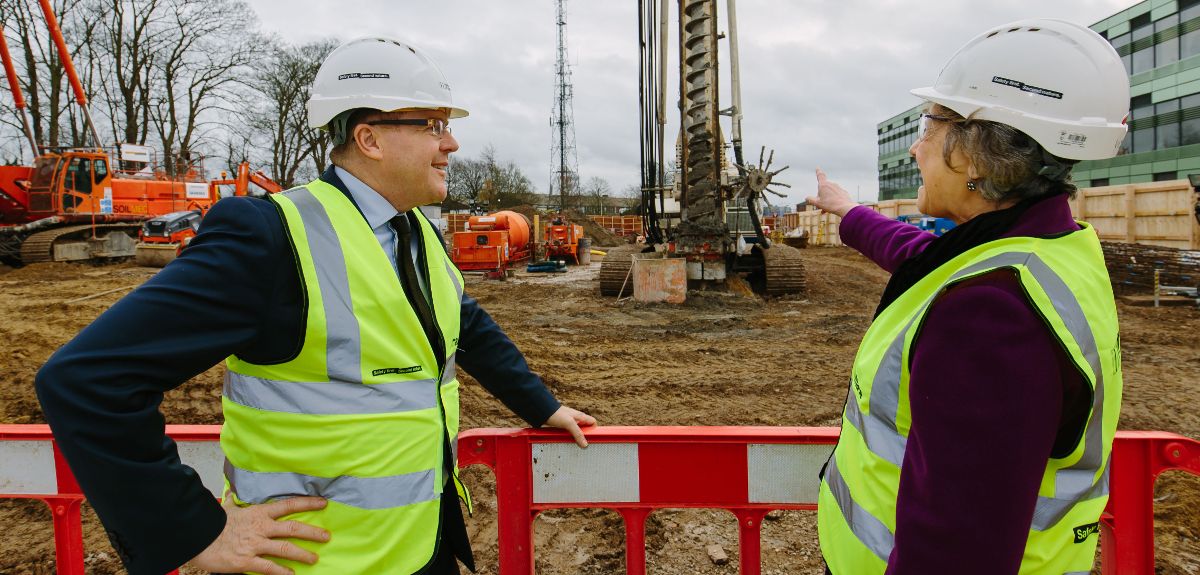
Image credit: Ian Wallman/ University of Oxford
UK life sciences minister says Oxfordshire 'doing something special'
The UK’s first minister for life sciences has praised biomedical researchers working across Oxfordshire.
George Freeman MP was visiting the county today (Friday 18 Dec 2015) to find out more about work being carried out by the NHS and businesses locally as well as by Oxford University, and about how all three are working together to create new treatments and technologies.
The Oxford Biomedical Campus is fast becoming a world class hub of the new technology and biomedical disciplines which are transforming 21st century medicine.
George Freeman MP, Parliamentary Under Secretary of State for Life Sciences
Starting at the John Radcliffe Hospital, Mr Freeman met Oxford University’s Regius Professor of Medicine Sir John Bell, Oxford University Hospitals NHS Foundation Trust Chair Dame Fiona Caldicott and Director of Clinical Services Paul Brennan, city council leader Bob Price and Local Enterprise Partnership Chief Executive Nigel Tipple, to discuss economic growth plans for the area and new approaches to integrated health care in the county.
He was then briefed on the work of the National Institute for Health Research Oxford Biomedical Research Centre and the Oxford Genomic Medicine Centre, including research into intelligent ultrasound by Professor Alison Noble, the development of TB gene sequencing by Professor Derrick Crook, the creation of a tablet-computer-based track and trigger system for medical records by Dr Peter Watkinson and the NightstaRx project of Professor Robert Maclaren, as well as the WGS500 programme led by Professor Jenny Taylor, which sequenced 500 human genomes and has laid the ground for the UK's 100,000 genomes project.
At the University of Oxford's Old Road Campus, Mr Freeman was briefed on the latest buildings being developed at the site, including the Big Data Institute, which will allow researchers to analyse millions of records to shed light on many health conditions, and the Bioescalator, which will support new and developing life science businesses, before finding out more about research at the University, one of Europe’s largest centres for biomedical research.
While admitting an allegiance to traditional rival Cambridge, George Freeman expressed his pride at the work being done in Oxfordshire. He said:
'The Oxford Biomedical Campus is fast becoming a world class hub of the new technology and biomedical disciplines which are transforming twenty-first century medicine. Through government and local funding, the Oxford team are building a truly integrated campus with NHS, university and industry researchers pioneering the genomic, informatic and diagnostic breakthroughs which are making Precision Medicine a reality for NHS patients. With companies like Adaptimmune and Immunocore here in the cluster, I am very proud as the UK's first minister for life sciences (and a Cambridge man) to note that Oxfordshire is doing something special.'
 New study on Amazonia's fire crises urges action ahead of the next burning season
New study on Amazonia's fire crises urges action ahead of the next burning season
 New heart disease calculator could save lives by identifying high-risk patients missed by current tools
New heart disease calculator could save lives by identifying high-risk patients missed by current tools
 Modern Slavery and Human Rights Policy and Evidence Centre moves to Oxford University after receiving continuation funding
Modern Slavery and Human Rights Policy and Evidence Centre moves to Oxford University after receiving continuation funding
 Study shows that island bats are valuable allies for farmers
Study shows that island bats are valuable allies for farmers
 Study reveals how humanity could unite to address global challenges
Study reveals how humanity could unite to address global challenges